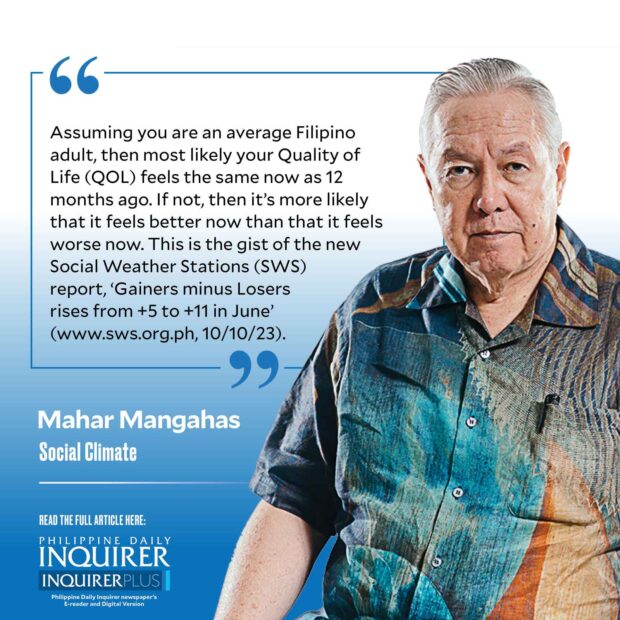Do you feel better off or worse off?
Dear reader, assuming you are an average Filipino adult, then most likely your Quality of Life (QOL) feels the same now as 12 months ago.
If not, then it’s more likely that it feels better now than that it feels worse now. This is the gist of the new Social Weather Stations (SWS) report, “Gainers minus Losers rises from +5 to +11 in June” (www.sws.org.ph, 10/10/23).
Article continues after this advertisementAsking whether the people are Gainers or Losers is the oldest question in the SWS data bank. It’s been asked in 149 national surveys, and in many more local surveys, ever since 1983. And it will continue to be asked.
In the June 2023 SWS national survey, a 45 percent plurality of adult Filipino respondents felt that their QOL (uri ng pamumuhay in the questionaire) had not changed in the past year.
Yet the 33 percent feeling better off exceeded the 22 percent feeling worse off by 11 points, giving a favorable Net Gainers score of +11.
Article continues after this advertisementA favorable or positive Net Gainers score is uncommon. It happened in only 24 of the past 149 national surveys. An absolute 50+ percent majority of Gainers has never happened—whereas an absolute majority of Losers happened in seven out of eight quarters in the pandemic years 2020-21.
The most common survey result has been a simple plurality of those feeling no change in their QOL—for most Filipinos, simple maintenance in the standard of living is enough to be thankful for.
In the four decades of 1983-2023, Net Gainers were positive only twice: once in 1986 and once in 1987, when the SWS national surveys were semi-annual (they went quarterly starting 1992). Gradually, the negative Net Gainers scores improved, until they narrowed to single-digit negatives by mid-2010.
Then, from mid-2015 to the end of 2019, Net Gainers went consistently positive, peaking at +18 in December 2019. Whereas the size of the economic pie, as measured by the gross national product (GNP), had all along been growing faster than the population, only in 2015-19 was the distribution of the pie among the people becoming more even.
The all-time high Net Gainers score of +23 happened in December 2017. Net gaining has very little connection to GNP growth, by the way; what really matters is keeping inflation down.Unfortunately, in 2020 the pandemic came, and the distribution of the pie went “catastrophic” (the SWS term for -50 and worse).
It bottomed at 6 percent Gainers versus 82 percent Losers, or net -76, in September 2020. There was a partial recovery in 2021, with Net Gainers ranging between -38 (“very low”) and -16 (“mediocre”).
In 2022, Net Gainers recovered to single-digit negative, which SWS calls “fair” by historical standards. By December 2022 it was at +8, which is classified as “high.” Last June’s +11, its first time back to double-digit positive, is classified as “very high.” Only 12 of the 149 national surveys in the SWS archive have scored “very high” (from +10 to +19); only two of them have scored “excellent” (+20 and up).
It is more meaningful to monitor well-being by counting people, instead of counting production or GNP. From the previous SWS national survey of March 2023, the proportion of Gainers rose by 4 points, from 29 to 33 percent, and the proportion of Losers fell by 3 points, from 25 to 22 percent; both changes are statistically significant, given the national error margin of plus/minus 3 points.
Thus the 6-point improvement in Net Gainers from +5 to +11 (numbers corrected for rounding error) is statistically significant. The new +11 is a recovery from the score of September 2019, but still below the +18 in pre-pandemic December 2019.
The recent improvement happened in the National Capital Region (NCR) and in the Visayas. The SWS survey results are designed for subdivision into four geographical areas, with a 6-point error margin in each. Compared to March 2023, NCR Net Gainers rose by 16 points, from +2 to +18, while in the Visayas it rose by 24 points, from -14 to +10. These are significant changes in these areas.
In Balance Luzon, Net Gainers went from +12 to +13. In Mindanao, it went from +6 to +2. Statistically speaking, Net Gainers did not change significantly in these two areas during the last quarter.
Area-wise, becoming a gainer in NCR is currently easier than in Visayas or Mindanao, but not quite easier than in Balance Luzon. The chances of being a gainer in Balance Luzon are better than in Mindanao, but not quite better than in the Visayas. The relative advantage of people in NCR and Balance Luzon is common, but not rigid; it varies from quarter to quarter.
Schooling is a dependable route toward becoming a gainer. The June 2023 Net Gainers scores are +25 for college graduates and +17 for junior high school (JHS) graduates, versus only -1 for elementary graduates and +1 elementary drop-outs.
College grads have consistently enjoyed positive scores ever since 2010, while JHS grads started enjoying them in 2016. In the pandemic, all educational groups went underwater. Then college grads have been the first to surface, followed by JHS grads. For those with less schooling, the chances of getting ahead are no better than a coin toss.
Contact: mahar.mangahas@sws.org.ph.

















